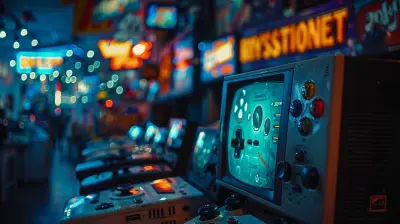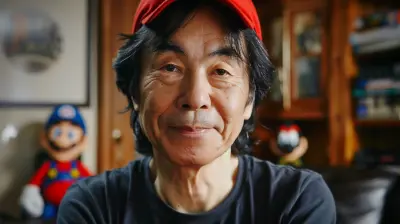How to Stay Calm and Confident in High-Stakes Card Games
2 July 2025
High-stakes card games can feel like a battlefield for your mind. Each decision matters, every chip on the table feels like the weight of the world, and your opponents’ stoic faces might as well be stone walls hiding their hand (and their intentions). It’s easy to get overwhelmed, lose focus, and start second-guessing yourself when the stakes are high. But here’s the thing—staying calm and confident is not just a “nice-to-have” in these moments; it’s the key to thriving.
In this article, we’ll unpack strategies to help you keep your cool, hold your ground, and walk away from the table with both your dignity and your bankroll intact. Let’s dive in. 
The Mindset: Calmness Is Your Superpower
Let’s kick it off with a truth bomb: high-stakes card games are as much a mental game as a physical one. It’s not just about the cards in your hand—it’s about how well you can handle the pressure. Imagine a majestic swan gliding gracefully across a lake. What you don’t see is that beneath the surface, its legs are paddling like crazy. That’s the kind of calmness you want to project in a game—controlled on the outside, strategic and focused on the inside.So, how can you cultivate this "swan" energy? It starts with preparation and self-awareness. 
1. Know the Game Inside Out
Confidence is rooted in preparation. Think about it: Have you ever walked into an exam unprepared and somehow felt great about it? Probably not. The same logic applies to card games. The more you understand the rules, strategies, and psychology behind the game, the less room there is for doubt.Spend time studying the game. Watch professional players if possible. Pay attention to situations they thrive in and how they navigate tricky scenarios. The more knowledge you absorb, the better equipped you’ll be to play without second-guessing yourself. Mindset hack: Constantly remind yourself that even if someone outplays you, it’s not because you’re incapable—it could just be their day. 
2. Practice Emotional Control
You can’t stop your emotions from bubbling up when you’re staring down a massive pot or trying to outwit a player who’s got you cornered. But here’s the catch—you can control how you respond. Emotional control is like a muscle; the more you work on it, the stronger it gets.One tried-and-true tactic? Focus on your breathing. When the stakes rise, your heart rate tends to spike, and your breathing may become shallow. Take a slow, deep breath in, hold it for a few seconds, and let it out slowly. Repeat this a few times. It’s like hitting the reset button on your brain’s panic mode.
Another tip: Give yourself permission to feel emotions without acting on them. Feeling frustrated about losing a hand or nervous about a big bet doesn’t have to derail you. Acknowledge the emotion, and then gently shift your focus back to the game. 
3. Silence the Inner Critic
Let’s talk about that little voice inside your head—the one that tells you, “You’re going to lose this hand,” or “Why did you even bother sitting at this table?” The inner critic can be brutal, but here’s the truth: It’s also wrong most of the time.Instead of letting it dictate your actions, try reframing those negative thoughts. Turn “I’m going to mess this up” into “What’s the smartest move I can make right now?” By focusing on the task at hand, you take power away from those unhelpful thoughts.
When in doubt, go full-on motivational coach mode with yourself. Remind yourself that confidence comes from taking risks and learning, not from playing it safe all the time.
4. Read the Room, Not Just the Cards
High-stakes card games aren’t just a numbers game—they’re a people game. Staying calm isn’t just about managing your own emotions; it’s also about understanding the emotions (and intentions) of those around you.Are your opponents fidgeting? Are their betting patterns suddenly erratic? These cues can tell you a lot about what’s going on in their minds. Think of it as piecing together a puzzle. The more you focus on observing your opponents, the less time you spend fretting over your own worries.
Pro tip: Practice your bluff-detection skills. A seemingly confident player might just be putting on a show to mask their uncertainty.
5. Establish a Ritual for Focus
Ever notice how athletes have little rituals before they compete? LeBron James tosses chalk in the air. Serena Williams bounces the ball the same way before each serve. These aren’t just quirks—they’re tools to center themselves and get into the zone.Having a ritual can work wonders for your own focus at the card table. Maybe it’s as simple as stacking your chips a certain way, taking a sip of water, or even repeating a mantra in your head like, “Stay sharp, stay calm.” Whatever it is, find a consistent habit that helps you tune out distractions and zero in on the game.
6. Know When to Walk Away
This might sound counterproductive when we’re talking about confidence, but hear me out: Sometimes the most confident move you can make is to step away. Whether it’s because your emotions are spiraling, your mind is clouded, or you just need a breather—it’s okay to hit pause.Taking a short break can clear your head and help you regain focus. Walk around, grab a drink, or just take a moment to breathe. And if you’ve reached the point where you’re consistently making bad decisions or feel outmatched, bowing out isn’t the same as quitting—it’s a strategic retreat.
7. Accept Variance and Embrace the Journey
Here’s the deal: Even the best players in the world lose sometimes. High-stakes card games have an element of luck that nobody can control. What is in your control is your attitude.Instead of getting caught up in a single loss, view the game as a long-term journey. Some days you’ll win big; other days won’t go your way. Accepting this reality takes a ton of pressure off your shoulders and lets you focus on playing the best game you can.
Think of it like surfing. You can’t control the waves, but you can learn to ride them with skill and grace.
The Takeaway: Confidence Is Built, Not Born
No one walks into a high-stakes card game and instantly radiates unshakable confidence. It takes time, practice, and a little bit of trial and error. But the good news? Every time you work on your mindset, control your emotions, and learn from your experiences, you’re building the foundation for a stronger, calmer, and more confident version of yourself.So the next time you find yourself at the table, facing down a critical decision, remember: You’ve got the tools to handle it. Stay calm, play smart, and trust yourself. After all, the game is as much about enjoying the ride as it is about winning.
all images in this post were generated using AI tools
Category:
Card GamesAuthor:

Madeleine McCaffrey
Discussion
rate this article
2 comments
Sophie Conrad
Great insights! Staying calm under pressure is crucial in card games. Your tips will definitely help improve my gameplay. Thank you!
September 30, 2025 at 4:40 AM

Madeleine McCaffrey
Thank you for your kind words! I'm glad you found the tips helpful. Best of luck at the tables!
Rowan Becker
Breathe, focus, trust yourself.
July 6, 2025 at 4:38 AM

Madeleine McCaffrey
Thank you! Those are key strategies for maintaining composure and confidence in high-pressure situations.


